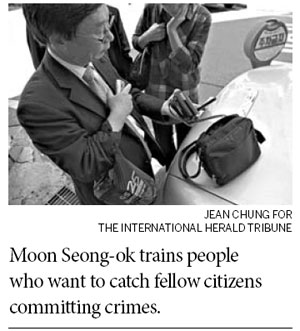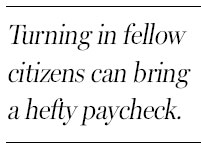On patrol, busybodies with cameras
Updated: 2011-10-09 07:57
By Choe Sang-Hun(The New York Times)
|
|||||||
SEOUL, South Korea - With his debts mounting and his wages barely enough to cover the interest, Im Hyun-seok decided he needed a new job. The former English tutor joined South Korea's growing ranks of camera-toting bounty hunters.

Known here sarcastically as paparazzi, people like Mr. Im stalk their prey and capture them on film. But it is not celebrities, politicians or even hardened criminals they pursue. Rather, they roam cities secretly videotaping fellow citizens breaking the law, deliver the evidence to government officials and collect the rewards.
"Some people hate us," Mr. Im said. "But we're only doing what the law encourages."
The opportunities are everywhere: a factory releasing industrial waste into a river, a building owner keeping an emergency exit locked, doctors and lawyers not providing receipts for payment so that they can underreport their taxable income.
Paparazzi usually develop a specialty. Mr. Im's favorite target is people who burn garbage at construction sites, a violation of environmental laws.
"I'm making three times what I made as an English tutor," said Mr. Im, 39, who began his new line of work around seven years ago and says he makes about $85,000 a year.
Bounties have a history in South Korea; for decades, the government has offered generous rewards to people who turn in North Korean spies. But in recent years, government agencies have set up similar programs for anyone reporting mainly petty crimes.
Snitching for pay has become especially popular since the world's economic troubles slowed South Korea's powerful economy. Paparazzi say most of their ranks are people who have lost their jobs in the downturn and are drawn by news reports of fellow Koreans making tens of thousands of dollars a year reporting crimes. The outsourcing of law enforcement has also been something of a boon for local governments. They say that they can save money on hiring officers. Rewards can range from as little as about $5 (reporting a cigarette litterer) to as much as $850 (turning in an unlicensed seller of livestock). Seoul's city government promises up to $1.7 million for reports of major corruption involving its own staff members.

But turning in neighbors can carry a social stigma. Mr. Im has not told his parents what he does for a living.
Bang Jae-won, 56, an eight-year veteran of the trade, said he felt proud of the times he caught people dumping garbage at a camping site or exposed marketing frauds, one of which once bankrupted him. "I regret the early, desperate days when I reported the misdemeanors of people as poor as I was," said Mr. Bang, who turned to this work after he was told he was too old by prospective employers.
"I don't tell my neighbors what I do because it might arouse unnecessary suspicions," he said.
Critics, however, say the reward program has undermined social trust. "The idea itself is good, but when people make a full-time job of this, it effectively privatizes law enforcement and raises ethical questions," said Lee Yoon-ho, a professor of police administration at Dongguk University in Seoul.
Moon Seong-ok, 64, runs a school that trains would-be bounty hunters. "Koreans' character of being impatient and constantly in a hurry makes them commit a lot of infractions, such as running a red light, changing traffic lanes illegally, cutting in line and throwing cigarettes," he said. "As long as this Korean trait exists, paparazzi will have a good business."
The New York Times
(China Daily 10/09/2011 page10)